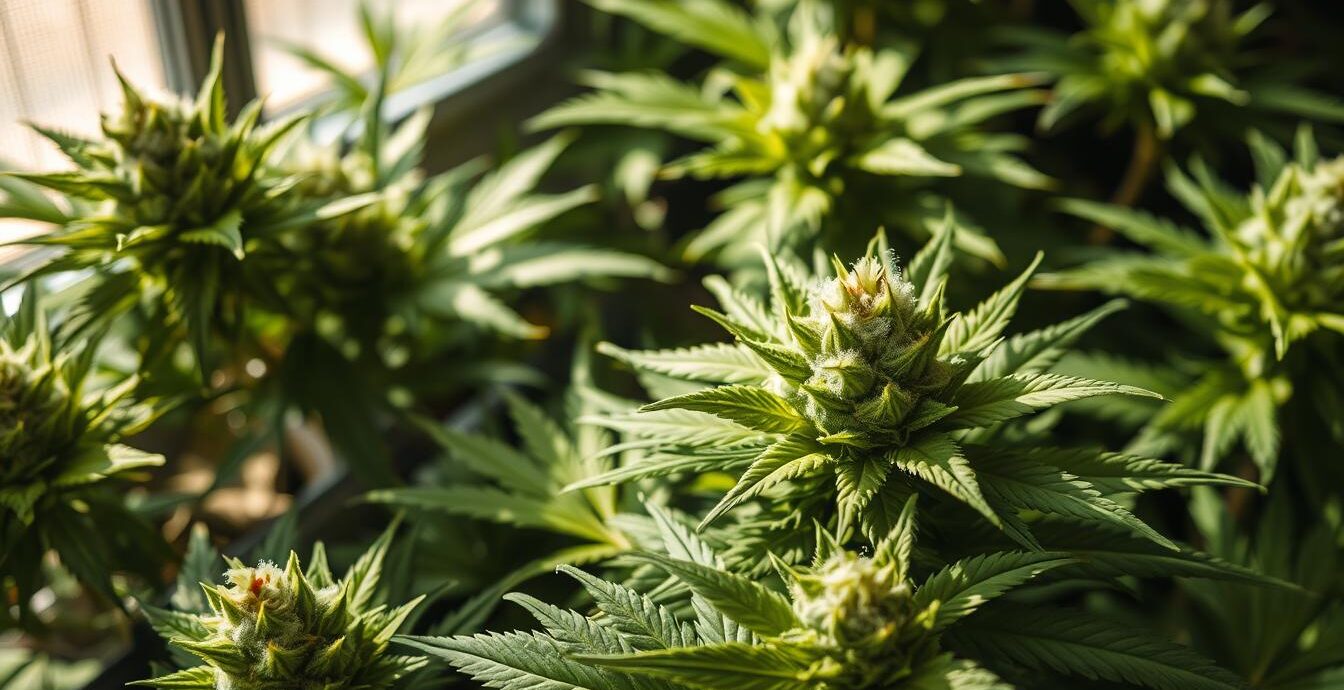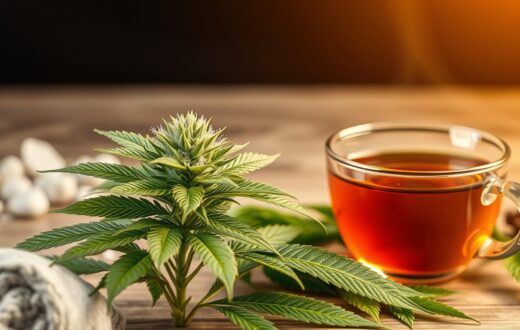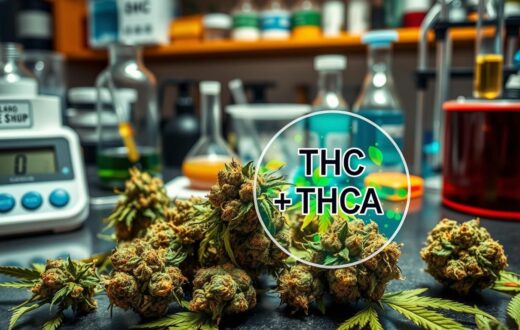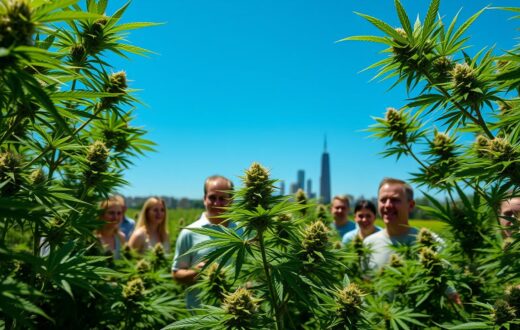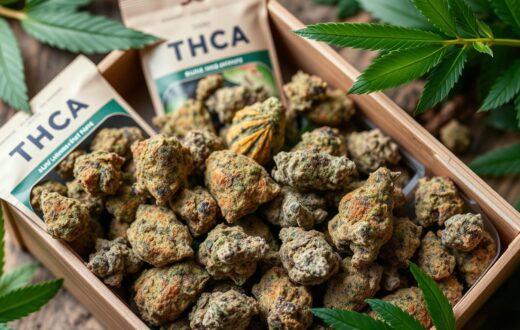Ever wondered why raw cannabis doesn’t get you high? The secret lies in THCA, a compound that’s sparking curiosity in the cannabis world. As we dive into the realm of THCA potency, we’re uncovering a fascinating aspect of cannabis that’s changing how we view this plant.
THCA, or tetrahydrocannabinolic acid, is the non-psychoactive precursor to THC. It’s abundant in raw cannabis and plays a crucial role in determining the potential strength of your cannabis experience. With some strains boasting over 30% THCA content, understanding its potency is key for both medicinal and recreational users.
Cannabis testing has revealed that only about 87.7% of THCA converts to THC when heated – a process called decarboxylation. This means that a strain with 30% THCA could yield around 26% THC. It’s this conversion that makes cannabinoid analysis so important for predicting the effects of different cannabis products.
As we explore THCA potency, we’ll uncover how it differs from THC, its potential benefits, and why it’s becoming a hot topic in the cannabis industry. Whether you’re a curious newcomer or a seasoned enthusiast, understanding THCA is key to navigating the complex world of cannabis.
What is THCA?
THCA stands for tetrahydrocannabinolic acid. It’s a key part of cannabis plants. It’s important for testing how strong cannabis is and for studying its compounds.
THCA is found in fresh cannabis flowers. It’s more common in live plants than in dried ones.
Definition and Basic Properties
THCA is not the part of cannabis that gets you high. It’s the non-psychoactive version of THC. It’s made by the plant using an enzyme called THCA-synthase.
Unlike THC, THCA doesn’t make you feel intoxicated. This makes it interesting for people looking for benefits without the high.
Comparison to THC
THCA and THC are different because of their chemical makeup. THCA has an extra group that stops it from working like THC in our brains. This is why it doesn’t get you high.
When you heat THCA, it turns into THC. This happens when you smoke, vape, or cook with cannabis.
While THC is known for its effects, THCA is being studied for health benefits. It might help with inflammation and protect the brain. As we learn more, knowing how THCA and THC work together is key for testing and studying cannabis.
The Science Behind THCA Potency
Understanding THCA potency is key for both cannabis fans and medical users. THCA, found in raw cannabis, has big health benefits. We’ll explore how to measure THCA and what affects its strength.
How THCA is Measured
Experts use advanced lab tests to check THCA levels in cannabis. Gas and liquid chromatography are top choices for precise analysis. These methods show exactly how much THCA is in a sample, offering deep insights into the plant.
Factors Affecting Potency
Many things influence THCA’s strength. Genetics is a big one – different strains have different THCA levels. Growing conditions, like light and nutrients, also matter a lot.
The curing process and when the plant is harvested also play a part. Terpene analysis is often done alongside THCA testing. Terpenes, the cannabis’s scent, can change how THCA works in our bodies.
When THCA is heated, it turns into THC. This change is important for those wanting cannabis’s psychoactive effects. But for those who like raw cannabis, keeping THCA intact is crucial. They must handle and store it carefully to avoid unwanted changes.
Importance of THCA in Cannabis
THCA is key in cannabis, offering benefits and risks. It’s found in fresh cannabis plants. This makes it interesting for both fun users and medical researchers.
Therapeutic Benefits
THCA has shown promise in therapy. It might help with chronic inflammation. Some studies say it could ease nausea and vomiting without the THC “high”.
It also might protect the brain, helping with neurodegenerative diseases.
Potential Risks
THCA has its downsides too. The quality of THCA products is very important. Always check the certificate of analysis for safety and strength.
Eating raw cannabis can upset some stomachs. But, when heated, THCA turns into THC. This changes its effects and legal status.
The laws about THCA vary by place. Users should know the local laws before using THCA. As research goes on, we’ll learn more about THCA’s benefits and risks.
How THCA is Different from THC
THCA and THC are two unique compounds in cannabis plants. They share some similarities but have key differences. These differences are important for understanding thca potency and following rules.
Chemical Structure Variations
THCA is the early form of THC. It has an extra part in its structure. This extra part stops THCA from causing a “high” like THC does.
When THCA is heated, it loses this extra part. This change makes it THC, a process called decarboxylation.
Psychoactive Effects
THCA and THC have different effects on the mind. THC can make you feel different, but THCA does not. This makes THCA good for those looking for health benefits without feeling high.
Research shows THCA might help with inflammation and arthritis. But, about 30% of people who use cannabis regularly might have problems related to THC, not THCA.
Knowing these differences is key for those who use or make cannabis products. It helps with labeling, testing, and following rules. As we learn more, we might find out more about THCA’s health benefits, making it even more different from THC.
Methods of Testing THCA Potency
Cannabis testing and cannabinoid analysis are key in the fast-growing cannabis industry. With marijuana legal for medical use in 37 states and for fun in 19, knowing the potency is vital. It matters for both those using it and the people who make rules.
Laboratory Testing Techniques
Professional labs use top-notch methods for testing cannabis. They use gas chromatography and liquid chromatography. These methods give exact amounts of THCA in cannabis samples.
Labs can spot THC levels as low as 0.3%, the legal limit for hemp. They use special tools to find specific mass-to-charge ratios. This ensures they get the cannabinoid analysis right.
DIY Testing Options
DIY testing kits are also out there, but they’re not as good. They can give a rough idea of THCA levels. But they can’t compare to lab tests for accuracy.
In 2022, over 10% of crime lab tests were to tell marijuana from hemp apart. This shows the need for reliable testing. For exact results, third-party lab tests are the best choice.
Factors Influencing THCA Levels
THCA levels in cannabis plants vary widely due to several factors. Understanding these elements is crucial for growers and consumers alike. Let’s explore the key aspects that affect THCA production in cannabis.
Strain Variability
Cannabis strains play a significant role in THCA content. Some strains, like Gorilla Glue and OG Kush, are known for their high THCA levels. The genetic makeup of a strain directly influences its potential for THCA production.
When selecting strains, it’s important to consider their genetic predisposition for THCA synthesis.
Cultivation Techniques
Growing methods greatly impact THCA levels. Light exposure, nutrient management, and harvest timing are critical factors. Optimal growing conditions include controlled light cycles, balanced temperatures, and proper humidity levels.
These elements work together to maximize THCA production in cannabis plants.
Potency testing and cannabinoid profiling are essential tools for growers and producers. These methods help determine the THCA content in cannabis products, ensuring quality and consistency. High-performance liquid chromatography (HPLC) is a preferred technique for accurate THCA quantification, supporting regulatory compliance in the cannabis industry.
Post-harvest practices also play a crucial role. Proper drying, curing, and storage methods preserve THCA levels after harvest. These steps are vital for maintaining the potency and quality of the final product. By focusing on these factors, growers can optimize THCA production and create high-quality cannabis products.
The Role of Temperature in THCA
Temperature is very important for the strength and stability of THCA. Knowing how heat changes this compound is crucial for both users and makers. Let’s look at how temperature affects THCA and learn how to store it best.
How Heat Affects Potency
Heat starts a process called decarboxylation, turning THCA into THC. This change happens fast when you smoke or vape. But, it can also happen slowly at room temperature.
Lab tests show that keeping the temperature at 220°F (104°C) for 30-45 minutes is best. Lower temperatures might not fully convert THCA, while too high temperatures can lose THC.
Best Practices for Storage
To keep THCA fresh, storing it right is key. Store cannabis in cool, dark spots to slow down the change to THC. This keeps it potent for longer.
Using special gear, like from trusted brands, helps control temperature well. This is great for keeping cannabis products good for terpene analysis and quality.
For dabbing THCA diamonds, use temperatures between 500°F and 650°F (260°C to 343°C). Lower temperatures, around 350°F to 400°F (177°C to 204°C), offer a smoother hit. Higher temperatures make it more potent. The type of dabbing equipment, like the nail, affects the temperature choice and experience.
Popular THCA-rich Strains
Cannabis fans looking for strong THCA strains have many choices. Flowers with 10% or more THCA are considered very potent. Some strains even have up to 30% THCA.
Notable Sativa Varieties
Sativa strains often give you a boost of energy. Lemon Cherry Gelato, though leaning towards indica, offers a balanced effect with 20.05% THCA. Alien Cookies is another hybrid with a strong kick, boasting 26.5% THCA.
These strains go through strict quality checks to meet high standards.
Recommended Indica Strains
Indica fans will like Blueberry Muffin, a hybrid with strong indica effects and 25.89% THCA. Oreoz is another indica-dominant choice with 25.06% THCA. These strains are tested thoroughly, and results are on their certificate of analysis.
GMO Sherbcrasher is the most potent at 28.5% THCA. Strains with over 20% THCA are usually strong enough for most users. Always check lab results to confirm potency and quality.
Medical Applications of THCA
THCA, found in raw cannabis plants, is showing great promise in medicine. It has caught the attention of many due to its potential health benefits. As studies go on, we learn more about how THCA can help us stay healthy.
Anti-inflammatory Properties
THCA has strong anti-inflammatory effects. This makes it a focus for research on conditions like arthritis and inflammatory bowel diseases. Many people in the U.S. struggle with chronic inflammation, which can cause serious health problems.
THCA’s ability to reduce inflammation could bring relief to those with these conditions. This is a big deal for many Americans.
Neuroprotective Effects
Researchers are looking into THCA’s neuroprotective properties. Early studies hint it might help with neurodegenerative disorders. This is good news for those dealing with dementia.
THCA might protect brain cells, opening new treatment paths. But, we need more clinical research to fully grasp these effects.
While THCA looks promising, following regulatory rules is key. The cannabis industry faces challenges in keeping product quality and potency consistent. Consumers should know that THCA can turn into THC when heated, changing its effects.
As research keeps going, we expect to learn more about THCA’s medical uses and its health benefits.
THCA and the Entourage Effect
Cannabis testing shows that THCA is one of over 100 cannabinoids found in fresh plants. It doesn’t get you high when it’s fresh. But, when dried or heated, it turns into THC, the psychoactive part.
Synergistic Effects with Other Cannabinoids
THCA and THC team up with other compounds in cannabis. This is called the entourage effect. It makes the plant’s benefits stronger. For example, THCA’s anti-inflammatory effects might help THC’s pain relief.
Importance of Terpenes
Terpenes, the plant’s aromatic compounds, are key to the entourage effect. They affect how THCA and other cannabinoids work in our bodies. Some terpenes might make THCA’s brain-protective effects stronger.
Products like live resin and rosin have rich terpene profiles. This gives them strong flavors and balanced effects. Many people prefer these whole-plant extracts over isolated compounds.
The Legal Landscape of THCA
THCA’s legal status in the United States is complex. The 2018 Farm Bill changed the cannabis industry a lot. Hemp-derived THCA with less than 0.3% THC is now federally legal. This change has opened up new chances for testing and profiling in the hemp world.
State Regulations on THCA
State laws on THCA are different everywhere. Some states treat THCA like THC, with strict rules. Others have looser rules, allowing more use and sale of THCA products. This mix of rules makes it hard for businesses to operate across states.
Companies need to know the laws in each place they sell. This ensures they follow the rules and keep customers happy.
Federal Policies and Compliance
The Farm Bill changed the rules for hemp and marijuana. For THCA products to be legal, they must pass strict tests. These tests check THC levels are under 0.3%.
This focus on testing has made businesses use better ways to check cannabinoids. They must test products with third-party labs. This keeps products legal and builds trust with customers.
The laws on THCA are changing fast. Research shows THCA might help with inflammation and protect the brain. But, federal rules still make it hard to use THCA widely. People and businesses need to keep up with new laws and trust good sources for THCA products.
Consumer Interest in THCA Products
The market for THCA products is booming. People are interested in THCA for its health benefits without the high of THC. This has led to more products and choices for consumers.
Trends in the Market
THCA flower is becoming more popular, especially if it’s organic and grown indoors. Brands like Diamond CBD and Cannaflower focus on sustainability. High-THCA strains like Gorilla Glue #4 and Sour Diesel are in high demand.
CBD Mall and Chill Cloud offer strains with high THCA content but within legal THC limits.
Popular THCA Consumption Methods
Raw consumption of THCA is on the rise. People are juicing cannabis or adding it to smoothies for non-psychoactive benefits. This method keeps THCA’s anti-inflammatory properties intact.
For those looking for a high, smoking or vaping THCA flower is still popular. Heat converts THCA to THC, offering psychoactive effects.
Lab testing is key in the THCA market. It ensures THC and CBD levels are correct, meeting legal standards. Terpene analysis is also crucial, as it affects the product’s experience and benefits. As research grows, we’ll see more innovative THCA products.
Understanding THCA Dosing
THCA dosing needs careful thought because of its special properties. It doesn’t get you high on its own but can turn into THC when heated. This changes how it affects you. Here are some safe usage tips and resources for users.
Safe Usage Guidelines
Start with a small amount of THCA and slowly add more. Legal cannabis products go through quality checks. They come with a certificate of analysis showing how much THC or THCA they have.
For example, a product might have 50mg of THCA. Remember, more THCA means more THC effects if it converts.
Consumer Education Resources
Learning about THCA is key for safe use. Online guides and dispensary info can teach you about dosing. If you’re using it for health reasons, talk to a doctor.
Factors like how your body handles it and your liver function affect THCA’s effects. Licensed dispensaries follow rules for safe packaging and labeling. This ensures you’re protected.
Try THCA in a place where you feel relaxed. If you feel anxious from too much, know it’s just temporary. Only about 87.7% of THCA turns into THC when heated. THCA flowers can be up to 40% potent. Always check the certificate of analysis for the right info.
Future of THCA Research
THCA potency is a big deal in the cannabis world. Researchers and users are excited about its future. Studies are underway to see how it can help us more than it already does.
Emerging Studies and Clinical Trials
Scientists are learning more about THCA’s benefits. They’re looking into its anti-inflammatory and brain-protective effects. Clinical trials are key to proving these benefits and finding new uses for THCA.
These trials help us understand how THCA’s strength affects different health issues. They also make sure everything is done right and follows the rules.
Potential for New Therapeutic Applications
Research shows THCA might help with neurodegenerative diseases, chronic pain, and metabolic issues. Its lack of psychoactive effects makes it great for medicine. As research continues, we could see new THCA medicines on the market.
This could change how we treat diseases, offering alternatives to regular drugs. The cannabis world is watching these developments closely. Keeping up with laws and pushing research forward is vital.
As we learn more about THCA, we’re getting closer to new, exciting treatments. This is a big step forward for cannabis-based medicine.
Conclusion and Final Thoughts
As we conclude our look at THCA potency levels, it’s clear that this compound is key in the cannabis world. Our journey through cannabis testing and cannabinoid analysis has shown us interesting facts about THCA’s nature and its potential.
Summary of Key Points
THCA, the precursor to THC, is found in large amounts in fresh cannabis plants. It often has levels over 15%, making high-THCA strains popular for their health benefits. Unlike THC, THCA doesn’t cause a high, which makes it interesting for medical studies.
The legal status of THCA products varies a lot, showing the complex rules around cannabis. In legal markets, cannabis dispensaries are the main places to find THCA products. For example, Ounce of Hope sells THCA flower with 0.3% delta-9 THC or less, following federal rules.
As research goes on, we learn more about THCA’s possible benefits, like fighting inflammation and protecting the brain. The ongoing studies in cannabis testing and cannabinoid analysis are promising. They might reveal more about this compound, opening new ways for health uses in the future.










